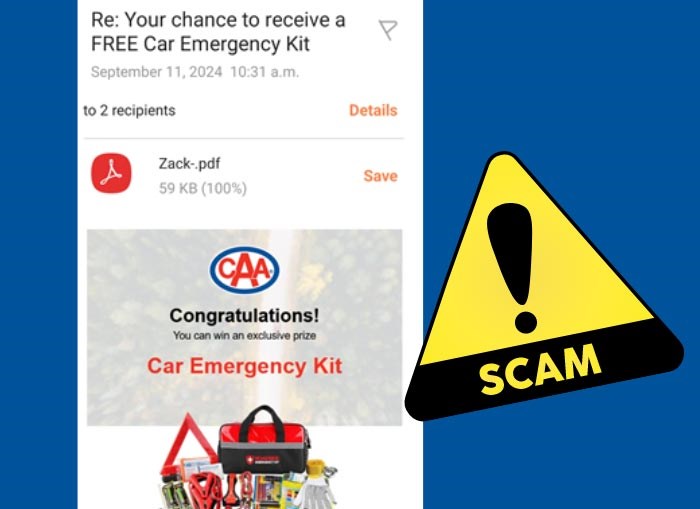There’s no such thing as a free car emergency kit.
No free booster cables, no road flares on the house, no complimentary “call police” sign.
The Alberta Motor Association (AMA) is warning residents of the province of the latest email scam “exploiting the confidence” members have in the brand.
The scam exists well beyond Alberta’s borders, and that’s not a coy reference to the ubiquity of cyberspace: all CAA and AAA club members are affected, too, as are other car clubs across North America, the United Kingdom, Australia and elsewhere. There is also evidence of fraudsters using this scam when targeting email addresses not associated with car clubs at all.
“We’ve received numerous messages from members and non-members reporting a scam where recipients receive an email with a chance to win a car emergency kit,” an AMA press release reads. “They’re instructed to answer a survey regarding their experience with the auto club or given an offer to purchase an extremely discounted emergency kit.”
The origin of the message varies, according to the AMA, but one thing is constant: The email address is never a verified account. Legitimate emails from AMA staff always end in @email.ama.ab.ca, @ama.ab.ca, @amaemail.ca, or @express.medallia.com.
Advice from the AMA, should you receive one of these fraudulent emails:
- Do not click any links or provide any information.
- Take a screenshot and report it to [email protected].
- Report it to the Canadian Anti-Fraud Centre online through the Fraud Reporting System.
- Report it as spam in your email app.
Now, click happens. If you did happen to activate a bad button or provide personal information, you’re advised to immediately:
- Change any passwords associated with the email you provided, including any financial institutions and your AMA Online Account.
- Notify your financial institution if banking information was entered, or a payment made.
- Report the scam to the Canadian Anti-Fraud Centre.
A query with the St. Albert RCMP on whether any complaints about similar scams had been received here was not answered before press deadline. The AMA says the personal information of its members has not been compromised.
“But cyber safety takes all of us: You can help protect your family and friends by passing this message along to them, whether they’re a current member, a past member, or a potential future member,” the release reads.
The AMA maintains a list of common active scams on its website. The emergency kit scam is the third listed for 2024; there were six such warnings issued in 2023.
The other scams warned of this year are predatory towing and fake AMA credit invoices.
The terrible tows
“Albertans experiencing a roadside breakdown or collision are solicited by a third-party towing company and subjected to high-pressure tactics to have their vehicle removed,” the AMA site explains in the first. “These ‘accident chasers’ will often falsely lead drivers to believe they have no control over where their vehicle is taken, resulting in huge (and fraudulent) towing and recovery fees.”
If this happens to you, the AMA recommends you decline their services and contact AMA.
“You have a right to choose who tows you, and a right to choose where your vehicle is towed,” the site reads. “You’re also under no obligation to immediately remove your vehicle from the roadside, unless directed by police.”
Employees and contractors of the AMA tend to be easily identifiable, with CAA and/or AMA decals on their vehicle. When they’re dispatched, they are always provided with basic information including your name and membership number. And if your phone is smart enough, you can even track the AMA tow truck with a unique link.
Make it ‘til they fake it
The other scam, which AMA sent out an alert on initially in April, sees potential victims receive an email alerting them to a credit on their account due to unused member benefits.
Click this link to receive the credit, the scam begs. Don’t do it.
The AMA site indicates that a key giveaway in this case is or was that the sender’s address in reported scam emails was "membership[at]primebenefits.com" and the subject line was "AMA-prime membership reverse."
If your inbox is darkened by such a message, the AMA urges that you forward a screenshot of any email interactions of this scam to [email protected].
If click happened, or you provided any information over the phone, you should “immediately update any related account information, and notify your financial institution and local law enforcement as appropriate.”
On the AMA website you can find more information on these and other recent scams, such as a travel agent hiring scam run on social media, fake websites promoting fraudulent insurance “companies” and bunk Alberta affordability payments via text.



